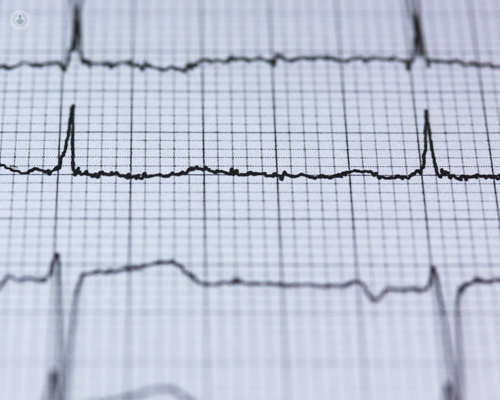How loop recorders are key to cardiac arrythmia diagnosis
Written by:If you experience a fluttering sensation in the chest, or a racing heartbeat, for example, it could mean you have a cardiac arrhythmia. And in turn, require further analysis by using an implantable loop recorder.
Leading cardiologist Dr Jonathan Behar details how this device plays an important role in ensuring experts can make the correct diagnosis and begin the right treatment.

What are its primary functions and features?
Implantable loop recorders are really clever devices that sit just underneath the skin. They're implanted very easily, within a matter of minutes, using a local anaesthetic procedure. They're pretty small; probably about 4 or 5 centimetres in length, and sit just underneath the skin on the chest wall.
They're able to detect abnormalities in the heart rhythm, so, particularly fast heart rhythms or particularly slow ones. Most importantly, we're able to correlate how you, the patient, is feeling at the time of observing what the heart rhythm is doing so that we can understand what your symptoms are due to. As a result of that, we recommend the necessary treatment.
Sometimes that treatment might be a catheter ablation procedure for a particularly fast heart rate, and sometimes it might be identification of a slow heart rate that might require a pacemaker procedure.
Occasionally, we might pick up an irregular heartbeat like atrial fibrillation, and this might be a really important diagnosis for some patients, as they require blood-thinning medication to prevent stroke.
In summary, an implantable loop recorder really has many functions. It's able to detect multiple different heart rhythm abnormalities, and is a very safe and quick procedure performed under local anaesthetic.
How does a loop recorder differ from other cardiac monitoring devices?
This is by definition, an implantable device. It sits just under the skin and is able to detect electrical activity in the heart. Because it's implantable, it's not a wearable device and therefore it stays inside of you for the duration of the battery, which is normally somewhere between three and four years.
After the battery runs out, or at a time where you decide with your doctor, you may be able to have it removed as required.
What are the specific clinical indications for recommending a loop recorder?
Your doctor may recommend an implantable loop recorder for a number of different reasons:
- Trying to pick up a normal heartbeat like atrial fibrillation; that may be a reason for you to be on blood-thinner medication.
- If we haven't managed to capture an abnormal heart rhythm, but we suspect a problem, it can be a very good way of detecting this over a long period of time where we can't predict when those abnormalities are going to occur.
- And finally, for those patients who may need a pacemaker it's a very good way to detect a slow heart rhythm over a long period of time, and see whether you do indeed a pacemaker or not.
Are there any activity restrictions or precautions that individuals with a loop recorder should follow to ensure optimal functioning?
Generally speaking, most people with a loop recorder can continue their normal life. Occasionally, if you're on blood thinners after the procedure there may be a bit more bruising than usual, and this is something to talk to your doctor about before your procedure. Indeed, be cautious after the procedure, but otherwise you can continue with your normal life and normal activities afterwards.
Could you provide a comprehensive overview of the loop recorder implantation procedure, including the patient's experience during the process and the subsequent monitoring and data analysis?
The implantation is relatively straightforward; it involves a local anaesthetic on the chest wall. Implantation of the device really takes a number of minutes. Sometimes we might put a stitch in the skin, or some steri-strips, which are like little plasters, on top of the wound, and a small dressing. It's really, as simple as that.
Within a few minutes, we can implant the loop recorder with minimal discomfort. In terms of the aftercare, generally the wound heals up within a matter of days, usually a week, and then we're able to remotely follow up the electrical rhythms of your heart via the Cloud, via an app, and via the pacemaker clinic.
If you require expert cardiology treatment in London, arrange an appointment with Mr Behar via his Top Doctors profile.


